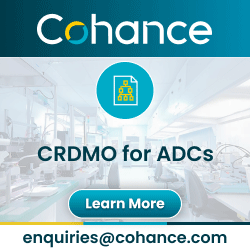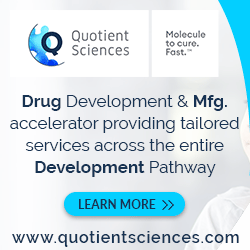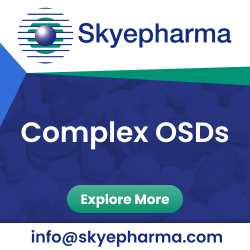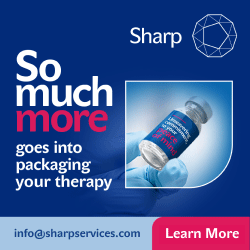Overview of Antibody Drug Conjugates (ADCs) & more on CDMOs offering custom ADC development & manufacturing, ADC payload & bioconjugation services.
Q1. What are ADCs and what is their importance?
The antibody drug conjugate (ADC) is a human monoclonal antibody conjugated with highly cytotoxic small molecules (payloads) through chemical linkers. These are a new class of biopharmaceutical drugs that have a very high potency to significantly alter and have a lasting change in the medical and pharmaceutical industries. This is reflected by the number of candidates in various preclinical drug development stages and clinical trials, which is in the hundreds.
Antibody drug conjugates are a type of chemotherapeutic agent. It is a novel treatment model that has the potential to fundamentally alter and make a shift in cancer chemotherapy. Unlike conventional chemotherapy treatments, which can damage healthy cells, antibody drug conjugates (ADCs) are targeted medicines that deliver chemotherapy agents to cancer cells.
ADCs act as smart bombs aimed at targeting cancer cells, combining chemotherapy and targeted therapy into a single intervention. ADCs are often administered as an infusion through the vein and are composed of three parts: a monoclonal antibody, a chemotherapy or cytotoxic payload, and a linker protein.
ADCs deliver the chemotherapeutic drug via a linker attached to a monoclonal antibody that recognizes and binds to a specific target as an antigen differentially expressed on tumor cells. This allows for sensitive differentiation between malignant and healthy cells. After successful ADC binding to the target ie., cancer protein or receptor, it releases a cytotoxic drug into the cancer cell and kills them. Because of this mechanism, ADCs are also referred to as biologic missiles.
With the specificity of monoclonal antibodies (mAbs), antibody drug conjugate (ADC) technology provides cancer patients with new opportunities. This technology is applied as foundational ADC therapy or as a potential complement to existing treatment approaches in the management of solid tumors and hematologic malignancies.
An ADC contains a potent cytotoxic small molecule drug that increases the cell-killing potential of monoclonal antibodies (mAbs). These present limited systemic exposure compared to standard chemotherapeutic drugs or biologics. Therefore, the above-mentioned features present ADCs as an important tool in targeting cancer treatment and further lead to increased ADC development and discovery.
Q2. What are the different steps involved in ADC development and manufacturing?
Antibody drug conjugates (ADCs) are an important class of potent drugs that selectively target a particular tumor marker. ADC manufacturing and development is complex and requires both biological and chemical understanding. However, there have also been obstacles and setbacks in ADC development and ADC manufacturing, along with effectiveness, and safety.
An ADC will have a highly specific and selective mAb directed against a tumor-associated antigen with little or no expression on normal tissue cells. Only a small number of payloads (usually an average of 3-4 payloads per antibody) can be attached to an antibody molecule without seriously impairing its biophysical and pharmacokinetic properties.
The successful development of antibody drug conjugates relies on several factors including antibody's specificity, drug's potency, drug-antibody ratio (DAR), stability of the linker, and distribution of drug on the antibody. Antibody drug conjugate development also requires the optimization of various steps, a complex process that combines chemistry and biology for the delivery and release of the drug. The ADC development process starts with payload selection entrailed by antibody engineering, antibody conjugation, and then ADC optimization and bioanalysis.
Following the development of ADCs, the next phase involves process scale-up, where scalable production methods for the antibody, cytotoxic drug, linker, and conjugation process are established. This is subsequently followed by ADC manufacturing which is a multistep process and involves cGMP ADC production and conjugation to form an ADC. After further purification and fill-finishing, the conjugated antibodies are processed as antibody drug conjugate products and transitioned to large-scale commercial manufacturing, ensuring compliance with quality and regulatory standards.
Currently, the ADC development and ADC contract manufacturing market landscape is highly fragmented, featuring a mix of start-ups, mid-sized firms, and well-established players. Due to the high cost and added complexity pharmaceutical and biotechnological companies tend to outsource the research, development, and manufacturing of their formulations to ADC CROs (contract research organizations), ADC CDMOs (contract development and manufacturing organizations), and CMOs (contract manufacturing organizations).
Q3. What are recent advances in ADC development?
A novel category of biopharmaceuticals called antibody drug conjugates (ADCs) uses monoclonal antibodies to target the tumor site with potent cytotoxic chemicals. Numerous ADCs have received regulatory approval for usage in clinical settings as they have demonstrated significant potential in the treatment of various forms of cancer. Additionally, ADCs are being investigated for the treatment of other diseases, such as viral infections and autoimmune disorders.
Recent approvals of ADC drugs for various cancers have propelled ongoing development in this field. These innovative agents achieve wider treatment windows by combining the advantages of high specific targeting of oncogenic cell surface antigens with the added cell kill from high potency cytotoxic ADC payloads. Aiming to combine the strong cytotoxicity of chemotherapy with the high specificity of targeted therapy, antibody drug conjugates (ADCs) are designed to selectively deliver cytotoxic payloads directly to target cancer cells. which is limited in case of chemotherapeutic drugs.
In subsequent years there has been a rise in the development of antibody drug conjugates as it plays an important role in offering precision medicine and targeted and personalized treatments. In addition to enabling better efficacy as compared to antibody therapeutics, ADCs exhibit higher stability, reduced toxicity, improved tumor selectivity, increased drug tolerance, and less systemic exposure.
Another advancement in this field includes the use of mAbs or other biologics to deliver highly potent active pharmaceutical ingredients (HPAPIs) carried through highly potent antibody drug conjugates to targeted cells. The HPAPIs display more targeted therapeutic efficacy in their bioconjugate form, preventing non-target cells from many of the harmful effects and enhancing the safety profile.
Nevertheless, the field of ADC has some potential outside of cancer treatment in the areas of immunological and musculoskeletal problems. ADCs have also previously been studied in early trials for cancer pain and myelodysplastic syndrome. ADC payloads are now being used in certain technologies that seek targeted drug administration in the absence of an internalizing antigen and mediate signals at the cell surface. Another approach involves temporary uncoupling of targeting and delivery steps, allowing for the antibody to deliver the cytotoxic payload at the cell surface.
The novel technologies for antibody drug conjugate development include site-specific conjugation and dual-targeting strategies, which are also expanding the potential applications of ADCs. With more ADCs entering clinical trials, the industry is steadily moving away from using conventional technologies to newer and more reliable approaches to conjugate such complex biomolecules. Antibody drug conjugate CDMOs offer ADC development services along with ADC conjugation services using advanced and innovative solutions. These CDMO for ADCs are well equipped with all the necessary technologies for the development of antibody drug conjugates and might also provide services for the clinical and commercial ADC supply.
Q4. What are the leading CDMOs / pharma companies offering ADC development services?
Various pharmaceutical organizations, such as contract development and manufacturing organizations (CDMOs), contract research organizations (CROs), and contract manufacturing organizations (CMOs), equipped with ADC drug development and manufacturing capabilities, can offer end-to-end ADC services. The CDMO services for ADCs include custom synthesis of ADC drug substances and drug products, early phase ADC development to pre-formulation and ADC commercial manufacturing.
The problem of assembling all the necessary expertise for the development and manufacturing of antibody drug conjugates is best left to the CDMO for ADCs. The CDMO services for ADCs cover the full development cycle of bioconjugates, from supporting cell lines and bioconjugation to cGMP manufacturing and ADC clinical supply.
The CDMOs are familiar with difficulties specific to the development and manufacturing of ADCs, such as handling highly potent antibody drug conjugates, cytotoxic payloads, and staging bioconjugation reactions with optimized antibodies. Additionally, the development and manufacturing of ADCs also include characterizing and coordinating with clinical investigations, manufacturing capacity for ADC clinical supply, and commercial manufacturing of antibody drug conjugates.
These leading ADC CDMOs, CMOs, and CROs might have several years of experience in ADC drug development and manufacturing. Some of the top ADC CDMOs with formulation capabilities for clinical and ADC commercial manufacturing, and ADC development are mentioned below:
Aurigene Pharmaceutical Services - Aurigene Pharmaceutical offers CDMO services for antibody drug conjugates. It is a contract research organization (CRO) that provides the development of ADCs, bioconjugates, monoclonal antibodies, biologics, and is involved in ADC process development. It also offers ADC conjugation services along with ADC commercial manufacturing of highly potent antibody drug conjugates.
Cerbios-Pharma SA - Cerbios is an antibody drug conjugate CDMO that provides the development and manufacturing of antibody drug conjugates and its components (mAb, toxin, payload, and antibody conjugates) along with bioconjugation services. It offers CDMO services for antibody drug conjugates including ADC development, and ADC contract manufacturing for commercial ADC supply.
Avra Laboratories - Avra Labs offers custom synthesis of ADCs and the development of ADC drug components including cytotoxic payloads, conjugates, and intermediates. It is an ADC manufacturer that provides commercial manufacturing of antibody drug conjugates and bioconjugates, along with other ADC development services for ADC drugs.
Axplora - Axplora is a CDMO for ADCs that offers bioconjugation services for the development and manufacturing of antibody drug conjugates. Its CDMO services for ADCs include ADC process development, custom synthesis of ADCs, ADC clinical supply along with other ADC services.
Veranova - Veranova is an antibody drug conjugate CDMO that offers ADC development services. It is a contract development and manufacturing organization that provides the development and manufacturing of ADCs, ADC linkers, and ADC payloads, along with ADC conjugation services. It is also a contract ADC manufacturer that offers commercial manufacturing of antibody drug conjugates.
Piramal Pharma Solutions - Piramal offers CDMO services for antibody drug conjugates such as the development of ADCs, ADC contract manufacturing, and bioconjugation services. It is an ADC manufacturer that offers clinical and commercial manufacturing of antibody drug conjugates along with ADC process development and ADC supply services.All Suppliers
















 Cohance Lifesciences, offers full range of CDMO services for small molecule APIs, intermediates, ADCs, Pellets and Formulations.
Cohance Lifesciences, offers full range of CDMO services for small molecule APIs, intermediates, ADCs, Pellets and Formulations.









